The Films Of David Fincher Ranked: From 'Alien³' To 'Gone Girl'
David Fincher began his directorial career making music videos for some of the biggest talents in pop music. Beginning with Alien³ in 1992, his work in features has combined a drive for technical achievement off-screen with a consistently recognizable interest in detail-oriented obsession on-screen. He is a consummate craftsman, but one with an uncanny ability to lay his finger right on the cultural pulse. Together, those talents result in films which have gone beyond reflecting cultural attitudes, to defining them.
With the release of his latest film, Gone Girl, we've taken the opportunity to revisit the director's narrative works on film. (And, briefly, in television.) Below is a list of the films of David Fincher ranked by achievement. It's a highly subjective effort, we realize. Where does Gone Girl fit in alongside Fight Club, Se7en, The Social Network, and Zodiac? What stands out as the best film in his career to date, and what virtues can we find even in his least successful efforts? As you'd expect with Fincher, the answer to that last question is a lot more detailed than it would be for many other filmmakers. Compare our list with your own after reading further.
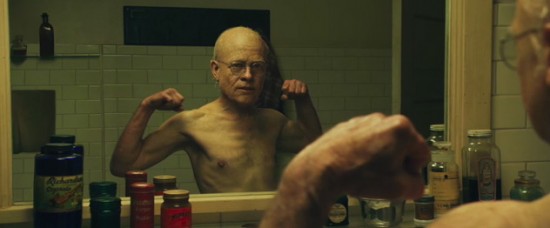 11. The Curious Case of Benjamin Button(2008)Scripted by Eric Roth, from a story by Roth and Robin Swicord, based on a short story by F. Scott Fitzgerald
11. The Curious Case of Benjamin Button(2008)Scripted by Eric Roth, from a story by Roth and Robin Swicord, based on a short story by F. Scott Fitzgerald
Shear this film of its wraparound story and it might rise one position in our estimation, but even then Benjamin Button would still be an emotionally stunted and distant tech demo. (Albeit one with a good sequence featuring Tilda Swinton.) Brad Pitt is poorly cast as the title character, and I can never shake the impression of Button as a dreamy Forrest Gump in which everything is even further detached from the audience. (Eric Roth scripted both films.) Ideally a mediation on the relationship between human life and time, Benjamin Button often simply feels lost.
As failed tech demos go, however, the film has legs. Fincher's detail-obsessive CG established a benchmark for altering actors appearances. Mention that an actor has been given the "Ben Button" treatment, and any film-aware conversationalist will know exactly what you're talking about.
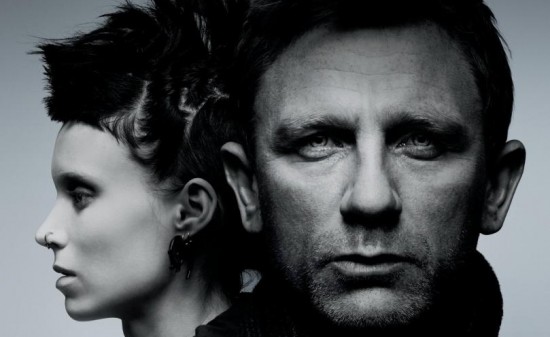 10. The Girl with the Dragon Tattoo(2011)Scripted by Steven Zaillian based on the novel by Stieg Larsson
10. The Girl with the Dragon Tattoo(2011)Scripted by Steven Zaillian based on the novel by Stieg Larsson
Fincher has an affinity for the thriller as a story construction that allows the particular tendencies of obsessive characters to fully flower, along with (at times) their destructive effects. It's a place he returns to more than any other, with varying degrees of success. Dragon Tattoo is a smartly-cast and gorgeously chilly vision of that concept, but also one that fails to become anything more significant.
The film is bound to the source text more tightly than Lisbeth Salander ties her tormenter, and even the its particular procedural interests can't give it either a life or identity of its own. Despite a deep and vicious crime-scene photo appeal, this adaptation rarely feels alive, and struggles to invigorate the audience. By focusing on the investigative aspects of the plot Fincher finds a way in to the story, but he never really finds a path back out again. When the procedural wraps up the spirit of the movie withers.
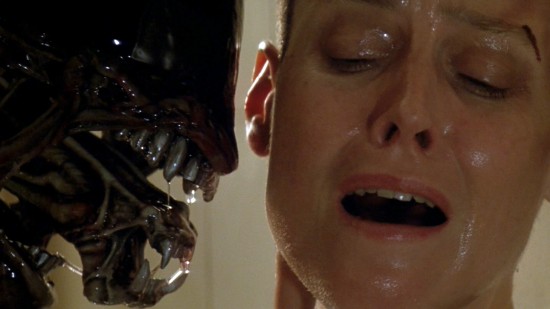 9. Alien³(1992)Scripted by David Giler & Walter Hill and Larry Ferguson (heavily revised by David Fincher), Story by Vincent WardFans of Aliens can rightfully spear this third film for its opening scene, which ruthlessly undermines the entire emotional arc of the second film. But credit Alien³ for daring to do something different, and for an adherence to concept and theme. The rocky process of scripting the film led to a "finished" story in which beats added for broad audience appeal sit poorly with the continued development of Ripley's story. And yet Ripley's evolving understanding of the chain of events that includes her life, the xenomorph, and the company still has the power to affect audiences. The longer "assembly cut" first released on DVD in 2003, presented without the supervision of David Fincher, fixes some of the problems in the theatrical cut, but cannot be considered a director's cut. From development to production and release, Alien³ is a significantly compromised film and a cautionary tale about the relationship between an individual and the company that backs and/or controls them. What an apt situation, given the arc of Ripley's story. And yet Fincher's visual and narrative approach gives Alien³ a unique personality. Here, a first-time feature director created images and situations that have the strength to stand up to iconic genre concepts from Ridley Scott and James Cameron. If that's "failure," we should all fail so hard.
9. Alien³(1992)Scripted by David Giler & Walter Hill and Larry Ferguson (heavily revised by David Fincher), Story by Vincent WardFans of Aliens can rightfully spear this third film for its opening scene, which ruthlessly undermines the entire emotional arc of the second film. But credit Alien³ for daring to do something different, and for an adherence to concept and theme. The rocky process of scripting the film led to a "finished" story in which beats added for broad audience appeal sit poorly with the continued development of Ripley's story. And yet Ripley's evolving understanding of the chain of events that includes her life, the xenomorph, and the company still has the power to affect audiences. The longer "assembly cut" first released on DVD in 2003, presented without the supervision of David Fincher, fixes some of the problems in the theatrical cut, but cannot be considered a director's cut. From development to production and release, Alien³ is a significantly compromised film and a cautionary tale about the relationship between an individual and the company that backs and/or controls them. What an apt situation, given the arc of Ripley's story. And yet Fincher's visual and narrative approach gives Alien³ a unique personality. Here, a first-time feature director created images and situations that have the strength to stand up to iconic genre concepts from Ridley Scott and James Cameron. If that's "failure," we should all fail so hard.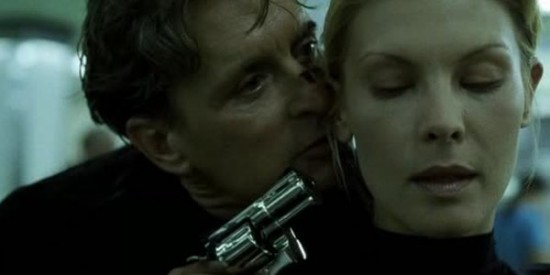 8. The Game
8. The Game
(1997)
Scripted by John D. Brancato and Michael Ferris
Fincher rose to the top of the directorial game in part because he can tap into very current emotional currents, and use them to power films that don't feel terribly dated to any particular era. The Game is an exception; despite a thorny and nuanced central performance from Michael Douglas, this picture feels very much like a product of its time. At the time Fincher's most personal picture to date, The Game is at its best when lingering on the small details of Douglas' obsessive character. It also sings when building upon the rich atmospheric detail that previously made Se7en so striking, but The Game deflates in the end.
In Fincher's run of thrillers, The Game is distinguished particularly by its cinematography. Here Fincher solidified a working relationship with Harris Savides, who would go on to lens Zodiac. As our praise of the film's detailed vision of San Francisco suggests, their collaboration was fruitful from the outset. Here Fincher's signature aesthetic really started to develop in a way that would pay off significantly in future films.
After the jump we continue our ranking of David Fincher's filmography.
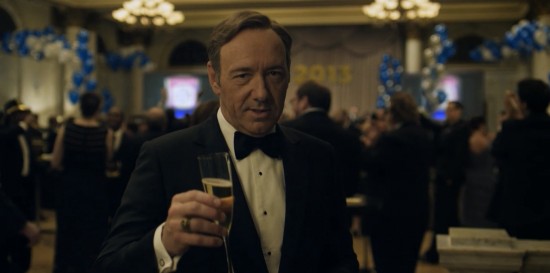 7. House of Cards(2013)Scripted by Beau Willimon
7. House of Cards(2013)Scripted by Beau Willimon
Consider this a bit of an interlude. David Fincher acted as exec producer on this Netflix series developed and scripted by Beau Willimon, and directed the first two episodes of the show. The first episode could almost be considered a stand-alone mini-movie, especially as it reunites Fincher with his surprise Se7en antagonist Kevin Spacey. The director was intimately involved in casting the show, and by this point had power enough to draw in first choices across the board. That understanding of the intense relationship between script and cast gave House of Cards a powerful advantage right from the start. Watching these two episodes, especially scenes with Spacey, the powerful Robin Wright, and Kate Mara and Corey Stoll, is like taking in a pop-art distillation of all Fincher's approach to casting on film.
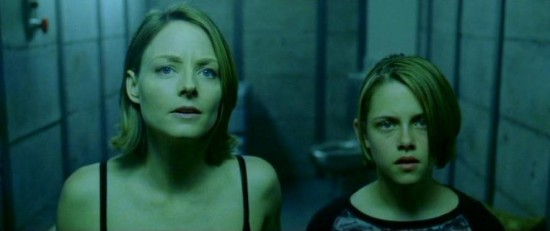 6. Panic Room(2002)Scripted by David Koepp
6. Panic Room(2002)Scripted by David Koepp
Fincher the craftsman takes firm charge in this minor but lively thriller. More unique than The Game, Panic Room is explicitly Hitchcokian in spirit. David Koepp's fairly thin screenplay is given a boost by intense performances from Jodie Foster, a very young Kristen Stewart and the trio of Dwight Yoakam, Forest Whitaker and Jared Leto. Together with the energy of the cast, Fincher's ability to fully establish and explore locations creates and maintains tension in this very elaborate single-location thriller.
Even so, in Panic Room Fincher's ambitions and obsessions arguably get the better of him. What could have been a quick, vicious exercise packs on extra weight thanks to the director's intensely detail-oriented planning and conceptualization of the film's setpieces. A full version of the central apartment was constructed in-studio, with multiple versions of sets built to allow unusual camera angles. The use of computer software to plan and visualized Panic Room expanded upon the CG work Fincher did with Fight Club, but also locked the director in to a very specific approach when the time came to shoot the film. The text of Panic Room is not explicitly personal, but when it comes to the effect of obsessive tendencies on the experience and outcome of a situation, few of Fincher's works are as ironically illustrative as this.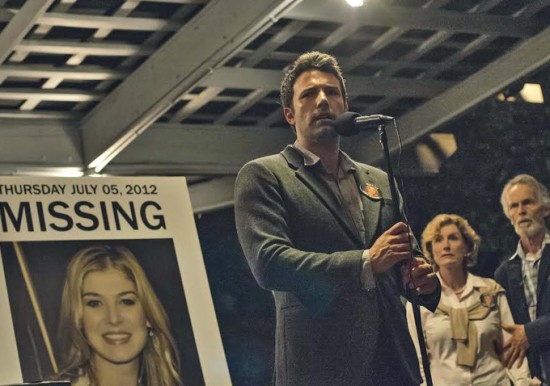 5. Gone Girl(2014)Scripted by Gillian Flynn based on her novel
5. Gone Girl(2014)Scripted by Gillian Flynn based on her novel
There's an easy and very superficial reading to take away from Gone Girl: *marriage*, amirite?!? But the surface of this lurid, even trashy thriller conceals a vicious satirical attack on the current media culture and the ways in which our understanding of media tactics affect our own behavior. Ben Affleck is perfectly cast as Nick Dunne, whose wife Amy goes missing on the morning of their fifth wedding anniversary. As Amy, Rosamund Pike is offered the chance to create a tornado of a performance, and she embraces the opportunity. More than perhaps any other character in Fincher's canon to date, the version of Amy Dunne created on screen here has the potential to inspire conversation and argument.
Leaping off from Gillian Flynn's novel, here Fincher also indulges small diversions and tics that expand the story far beyond the bounds of a thriller. Initially an almost-frigid mystery, Gone Girl reveals its true spirit to be so blackly twisted that it edges into deep, dark comedy in the third act. Part of me wants to see a cut of Gone Girl that is far more contained, because the core mystery is something we've been conditioned to expect as the total experience of a film such as this. But here Fincher is at his most deliberately subversive since Fight Club, and he toys with the material, and the audience, in a manner that should be exhilarating to any genre fan.
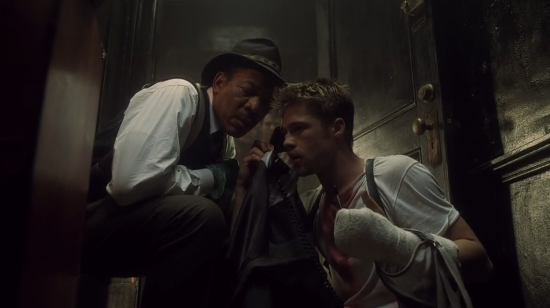 4. Se7en(1995)Scripted by Andrew Kevin Walker
4. Se7en(1995)Scripted by Andrew Kevin Walker
It's difficult now to remember the shrugs this film earned before opening — the guy who made Alien³ and those Madonnna videos doing a serious thriller with Brad Pitt? Yeah, whatever. Then Se7en carved the faces off audiences, and set up Pitt to be a true movie star rather than just a pretty romantic lead. Walker's script gets right to the meat of the crime picture, and then rubs our faces in despair for two hours. Which is to say: Se7en gives us exactly what we want, and then makes us regret it. From Kyle Cooper's intimidating, ultra-creepy titles to the extreme visions of murder, Se7en is literary but visceral, surprising but not cheap, and drenched in an oppressive atmosphere to match the endless rain that envelops the characters.
We became truly aware of Fincher's talent for casting here, as Pitt's energy and the gravitas of Morgan Freeman add an extra layer of tension to Walker's script. Fincher obviously understands both the destructive impulsiveness of Pitt's Detective Mills, and the cautious and methodical work of Freeman's Detective Somerset, and he knows just when to pit the actors against one another, and when to bring them together. Se7en processes genre concepts and elevates them, and stands as a top-notch example of what can be achieved with a detective thriller.
After the jump we conclude our ranking of David Fincher's filmography with the top three films. Which movie ranks #1? Find out.
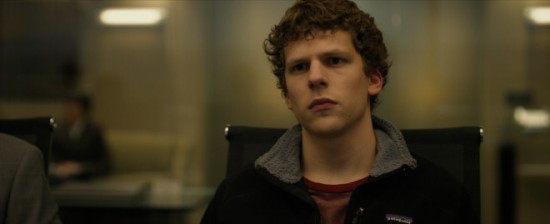 3. The Social Network(2010)Scripted by Aaron Sorkin based on the book by Ben Mezrich
3. The Social Network(2010)Scripted by Aaron Sorkin based on the book by Ben Mezrich
The concept of Fincher as a chronicler of personal obsessions was well understood by the time he made this profile of Facebook founder Mark Zuckerberg, and The Social Network gave him a chance to look at an individual as a representative of the banal urges to which we all fall prey. Choosing Jesse Eisenberg to lead the film proved to be a tremendously perceptive casting choice, and Eisenberg turns Aaron Sorkin's script into something that goes into territory that is far more ugly the typical tabloid tell-all. This vision of Zuckerberg is utterly unlikable and yet strangely empathetic. Anyone whose life has migrated onto the internet will see something of themselves behind his cold eyes.
While his genre thrillers can be chilling, The Social Network may be Fincher's most deeply unsettling film to date, as it leaves us with an unshakable image of isolation as the result of Zuckerberg's drive to success. This is a person who could be any of us, and who many aspire to emulate; this eyes-wide-open view of modern success is painfully potent.
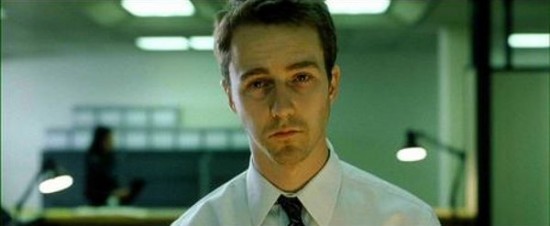 2. Fight Club(1999)Scripted by Jim Uhls based on the book by Chuck Palahniuk
2. Fight Club(1999)Scripted by Jim Uhls based on the book by Chuck Palahniuk
Earlier I dinged The Game for being dated, and one could argue that Fight Club is even more a product of the late '90s than The Game. But few films are able to crystallize the elements of their milieu in the way in this manner. Fight Club captures the generational transition from Baby Boomer to Gen X, skewering consumerism even as it is explicitly self-aware of its own nature as "product." It satirizes masculinity so deftly that it has been held up as an aspirational ideal by the very people it scorns. Like Se7en before it, this film achieves an understanding of personality and control by examining a paired character set, but this time Fincher goes even further into pop psychiatry, taking the risk of explicitly defining an entire generation.
Fight Club is high-level alchemy: novel to script translated through cast and camera to an idiosyncratic set of flicking images which present the story in a way that is purely cinematic. It is the true blossoming of Fincher's work as a film craftsman, and the film's tremendously un-subtle tricks disguise a very forward-thinking approach to integrating analog and digital work. That Fight Club was even able to escape the cage of the studio system is rather amazing; that it has endured as a bizarre artifact of corporate punk rock is not.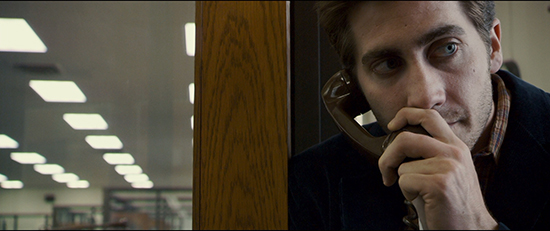 1. Zodiac(2007)Scripted by James Vanderbilt based on the book by Robert Graysmith
1. Zodiac(2007)Scripted by James Vanderbilt based on the book by Robert Graysmith
It's rare that a story that is unresolved by definition can be as satisfying as Zodiac. Here David Fincher's own obsessions feed a story about obsession, and his empathetic approach proves to be exactly the entry point we need to the story of a real-life cold-case serial killer. Zodiac is the ne plus ultra of the police procedural, a film patient enough to watch characters doing diligent drudgery, and inventive enough to make us want to keep looking. Once again, casting instinct pays off. Jake Gyllenhaal seizes the chance to create a bizarre yet familiar compulsive, and Mark Ruffalo, Chloe Sevigny, Anthony Edwards, and a pre-Iron Man Robert Downey Jr. all craft their own individual puzzle pieces with great skill.
Fincher patiently guides digital artists to exemplary work in tandem with sublime cinematography from the late Harris Savides. The combined efforts of the technical crew result in a seamless recreation of San Francisco across a broad span of time — one that is often so good that viewers can't tell the difference between locations and stage shoots.
The script by James Vanderbilt, and Fincher's own emphasis of elements in its approach to the real-life Zodiac story show both the rewards of chasing fine details and the dangers of giving in to one's own compulsive drive. Having learned from the experience of Panic Room, Fincher seemingly floats through the complex sea of information and technical detail rather than allowing it to wash over him. The effect of watching the film is to feel the weight of the Robert Graysmith's impulses and unshakeable concerns, but also to understand precisely what effect they have on a life.
